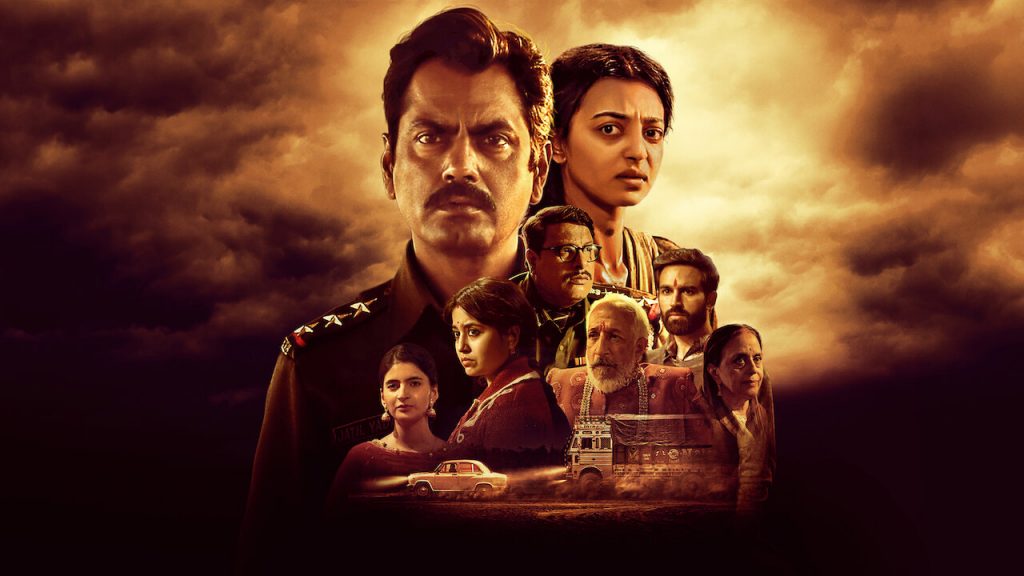Honey Trehan’s maiden venture as a director, Raat Akeli Hai (2020), begins with a gruesome act of crime, whose revelation at the climax of the film opens the can of worms that maliciously crawl and crumble the prestige of a strongly patriarchal family. The skeleton surreptitious hidden in the cupboard of lies and deceit makes its hideous emergence, thereby unraveling an embittered truth from the past.
Thakur Raghubir Singh, an aging and affluent man, is murdered on the night of his wedding. His bride Radha, and the other family members naturally come under the radar of Inspector Jatil Yadav’s suspicion. As the investigation advances, Jatil has to scrupulously marshal his way in extracting the truth from the suspects as well as confronting the obstruction, with a definitive machoism, from a corrupt politician who is colluding blatantly with the senior police official.
Many noir thrillers emphasize style over substance, and acquire a mechanical tone and don’t give much importance to the socio-political underpinning of the story. This is where the treatment of the film differs. On the surface, it has all the whodunit elements but its core explores the theme of female oppression child sexual abuse and objectification of women. Such elements are not usually found in most of the popular Hindi cinema that has dealt with this genre. The screenplay by Smita Singh is filled with small twists and turns, but not so many that the plot becomes difficult to follow. And to her credit, the subplots are well developed as is the main story.
Throughout the film, the character of Jatil Yadav, played by Nawazuddin Siddiqui, has been portrayed as an upright and honest police officer, who will go to any extent unless the criminal is brought to justice. To add contrast to his characterization, Jatil is also shown to be bickering with his mother, regarding his inability to find a suitable life partner. He is neither young nor fair-skinned and hence devalued in the marriage market. He uses a fairness cream that he hides behind the mirror. Moreover, Jatil tells his mother that he wants a girl with decency and unblemished character, who knows her limit at the house and outside. But he develops a soft corner for Radha, who has been bought by Raghubir Singh and is considered as a mistress by the family members as well as individuals of the society despite her marital status. The fatal attraction of Jatil towards Radha underlines a shift in the moral attitude of the protagonist, who goes against the orders of his senior to protect the dignity and as well as the life of the damsel in distress.
The character of Radha, portrayed by Radhika Apte, has all the traces of a stock femme fatale character with the attributes of a mysterious and beautiful woman, whose charms ensnare male, often leading them into traps. She bares her wounds, inflicted upon her by Raghubir to Jatil during the process of inquiry as a means to draw sympathy from him. The woman may be the offender and yet Jatil is attracted by the danger as much as by her luscious allure. As his investigation progresses, however, he finds that the woman is far more complicated than he suspected.
The supporting characters, that comprise of Shweta Tripathi, Aditya Srivastav, Tigmanshu Dhulia, Shivani Raghuvanshi, Ila Arun amongst others, are presented as more than mere colorful misfits decorating the background. It is a perfect ensemble cast with inadequate fleshing owing to its minimal screen presence. They make their presence felt whenever Jatil makes an appearance but are never shown to have their own personal space. And hence, they are used more as a medium to oscillate the needle of doubt from one person to the other. Then there is a brutal assassin who does not bat an eyelid before committing a murder. He is a merciless human who has no remorse or compassion for other human beings but lacks the salubrious grisliness of Bob Biswas in Kahaani (2012) or the noxious finesse of Malcolm Murad in the Indian web television series, Sacred Games, which was co-written by the screenwriter of the film.
There’s no denying the film’s technical virtues: the cinematography, the set design, the costumes, the hairstyles and the makeup. The narrative moves at a brisk pace, under the skillful precision of the editor A Sreekar Prasad, flowing along a familiar noir stream that easily survives a few minor glitches. The disquieting score by Karan Kulkarni strikes exactly the right cord.
The gratifying arc of a thriller unerringly reckons on the climax. So when the director opens the cards and viewers put together the pieces, somehow a logical scenario emerges. Yet, the twist in the story is not entirely satisfying but we do sympathize with the plight of the culpable character and the provocation that motivated the heinousness of the crime. The film ends with a ray of hope for the protagonist, embarking on a new journey. However, it leaves the viewers a little forsaken as certain avenues that could have strengthened the narrative are not explored more deeply.
Hindi, Thriller, Color


